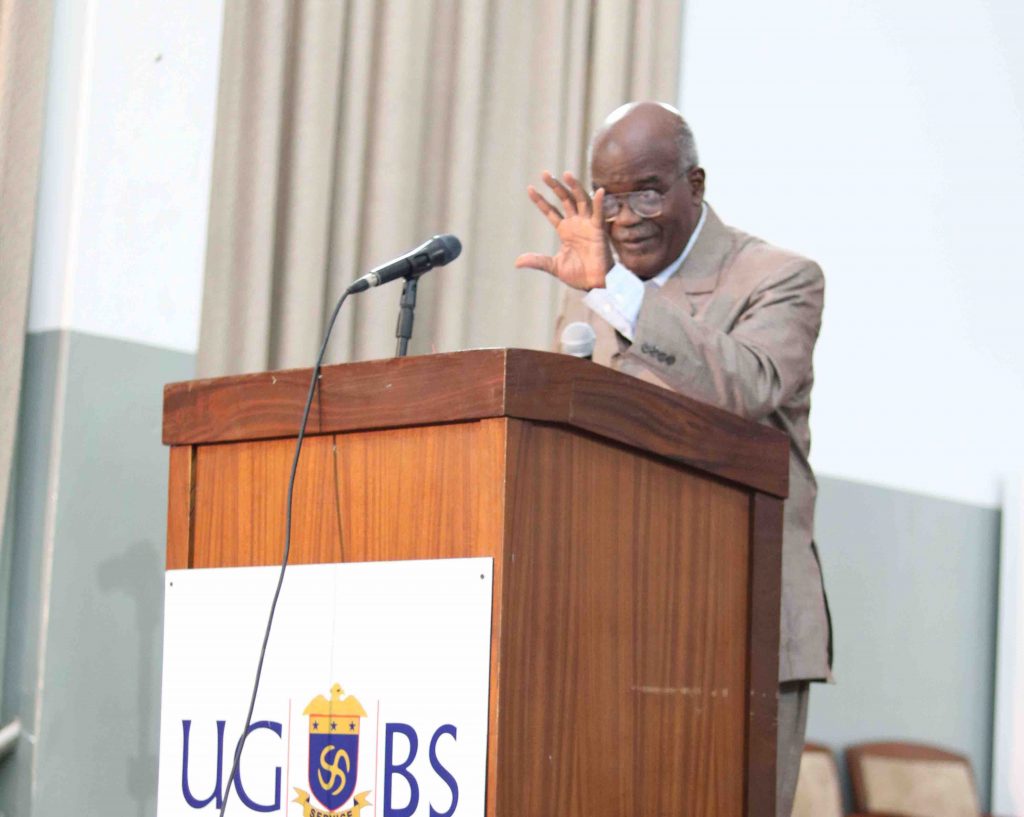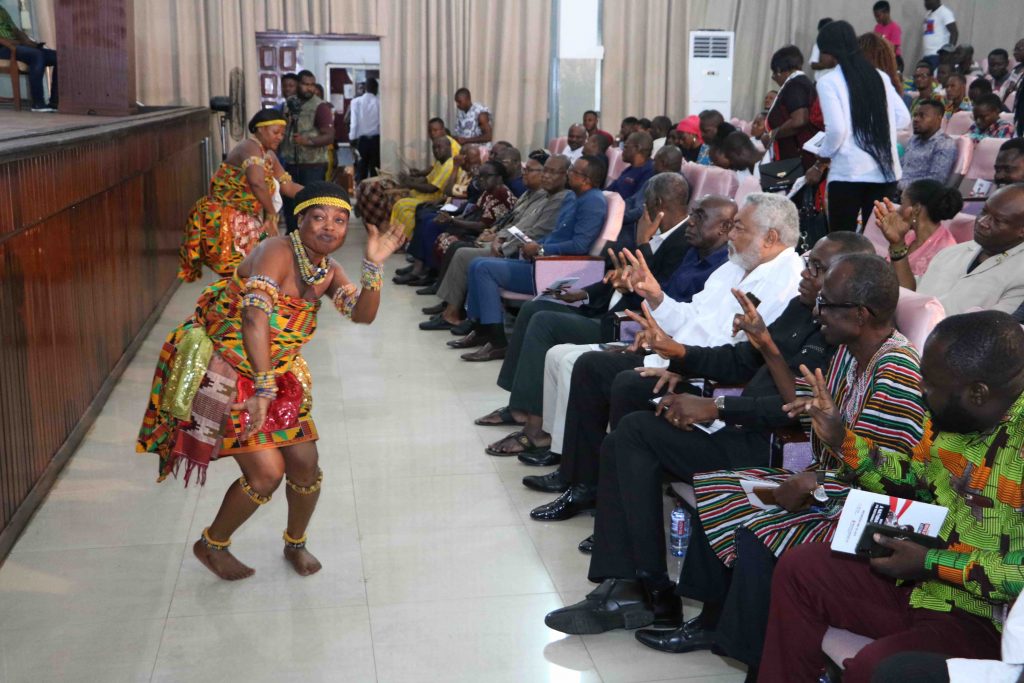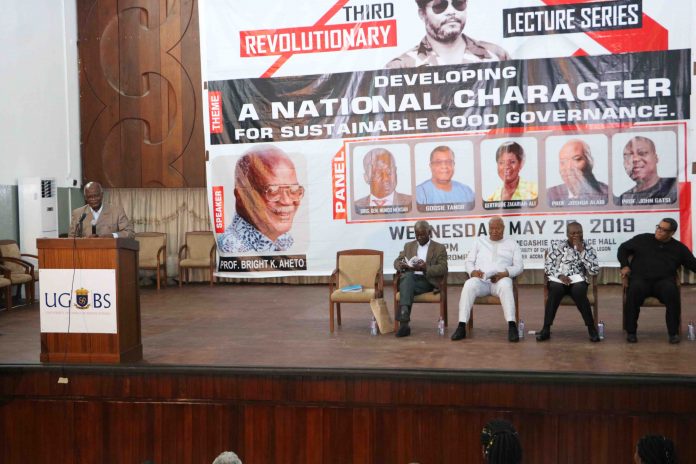|
Getting your Trinity Audio player ready...
|
The lead speaker at the third June 4 revolutionary lecture, Professor John Bright Kobla Aheto, says for Ghana to achieve good public governance it needs a dynamic and broad-minded leader who is an upright steward and possesses a flawless vision to pioneer the country’s transformation.
He described the current political dispensation as a big joke and said the New Patriotic Party and the National Democratic Congress had “completely failed the nation”.
Professor Aheto said in view of the gross retrogression of our nation, the only viable thing to do is to resort to sustainable good governance as a national agenda.
The keynote speaker said though there is a deliberate assault on institutions of state, the civil service now an order-taking institution, the bench packed to the limit and things falling apart, we are pretending everything is okay.

Professor Aheto said ingredients needed to achieve good public governance included the independence and integrity of all national administrative institutions and arms of government, holistic, integrated, critical and creative thinking as well as a conscious effort to protect the rights of the citizenry.
Delivering the lecture at the R.S. Amegashie Hall of the University of Ghana Business School on Wednesday, Professor Aheto who is a management expert, said the pillars of public governance included integrity, accountability, fairness and equity, transparency and independence.
“Public governance implies that the leaders, politicians, directors, civil servants and public servants are accountable to the nation and citizenry,” Professor Aheto said.
The lecture which was under the theme, “Developing a national character for sustainable good governance” was part of activities marking the 40thanniversary of the June 4 uprising.
Professor Aheto said June 4 was an unstoppable and easily predictable insurrection which was borne out of a rare combination of devastating and endemic corruption, bad governance, lack of discipline, impunity by leaders in the face of deep-rooted frustration of the masses and the bankruptcy of political governance.
Other speakers at the event were General Nunoo Mensah, Prof Joshua Alabi, Professor John Gatsi and Goosie Tanoh.
Below is the full text of Professor Aheto’s lecture.
THIRD REVOLUTIONARY LECTURE SERIES
“DEVELOPING A NATIONAL CHARACTER FOR SUSTAINABLE GOOD GOVERNANCE”
Mr. Chairman, Your Excellency Flt. Lt. Jerry John Rawlings, former President of the Republic of Ghana, all distinguished guests and participants. I respectfully observe all necessary protocols required for this very important national lecture.
It is a great honour and indeed a rare life-time opportunity for me to have been invited to speak at the 40th anniversary of the June 4th anniversary’s
Third Revolutionary Lecture Series
On the topic
“DEVELOPING A NATIONAL CHARACTER FOR SUSTAINABLE GOOD GOVERNANCE”
Important issues in and about the topic:
- Revolution, revolutionary; develop; national; character; good; governance
- As a teacher, my first obligation is to fully understand the topic and try to address it in the most objective, and very open-minded manner possible. I do not claim any expertise in the issues raised in the topic. Rather, I represent a very important segment of the Ghanaian population. That segment which, largely through no fault of their own, cannot and have not been as informed and knowledgeable as others. We are also part of, indeed the greater part of Ghana.
Definitions that reflect current usage of the words in social sense, not political sense.
- Revolution (noun):
- A fundamental change in the way of thinking about or visualizing something;
- A change of paradigm;
- A sudden radical, or complete change, apparently from the idea of reversal of direction;
- A sudden extreme, or complete change in the way people live, think, work, behave, etc.;
- A sudden, extreme, or complete change (as in the manner of living or working);
- A radical and pervasive change in society and the social structure;
- Sudden, complete or marked change in something;
- Necessary transition from one system in a society to the next;
- A far-reaching and drastic change, especially in ideas, methods, attitudes, mindset, etc.
- Revolutionary: (adjective)
- Constituting or bringing about a major or fundamental change;
- Causing or relating to a great or complete change;
- Being or bringing about a big or important change;
- A transformation; a new way of life and being;
- Of, characterized by, favoring, or causing a revolution in a governance or social system;
- Bringing about or constituting a great or radical change;
- Of, characterized by, favoring, or causing a revolution in a governance or social system;
- New and extremely important idea that is new and exciting and not like anything that has existed or been done before
“EARTH ROTATES ON ITS AXIS AND REVOLVES AROUND THE SUN.”
As I prepared for this presentation and pondered over the two words “revolution” and “revolutionary”, two other important words came to mind from my secondary school days in a current affairs class – treason and traitors. After the failed assassination attempt on the life of the founder and first president of Ghana on Thursday, 2 August 1962, a classmate defined the two words as “wrong doing in Ghana” and “wrong doers of Ghana” respectively.
These words come in connection with the long forgotten names of Malam Mama Tula, Teiko Tagoe, and Kulungugu. There was another, an innocent young seven-year old flower girl, Elizabeth Asantewaa, whose name never featured that much after the blast. God bless her innocence. Democrats indeed! Human rights for sure! She was a martyr – long forgotten by most, but fondly remembered by a few.
THE JUNE 4TH UPRISING AND GOVERNANCE: THE CAUSES
An uprising borne out of a rare combination of devastating and endemic corruption; bad governance; lack of discipline; impunity by leaders in the face of deep-rooted frustration of the masses; suffering in the land with very bankrupt political governance system; economic mismanagement with over 300% inflation, massive devaluation, failed economy, extensive shortage of all essential commodities; depleted coffers; endemic and devastating corruption of the political elite of unprecedented proportions; a crippled economy; unmatched bribery, graft, dishonesty; crippled market women and SMEs; indiscipline all over the place, even in all the forces; ‘kalabule’ as a national ritual.
June 4 was an unstoppable and easily predictable salvation. It was what, to the utter disgust of all his colleagues, a late very Honourable man called “a necessary coup”. It reverberated across the entire country with wide acceptance and the cries and pleas of “let the blood flow”. That was then – 40 years ago! The cry then of “Probity, Accountability, Integrity, Discipline, and Social Justice” as a basis for sustained good governance was launched. The improbable promise of cleaning up the system and turning over governance to the elected people was surprisingly kept!
The current democratic dispensation – with multi-party participatory democracy has become a big joke. The two major parties – the social democrats or radical left – NDC – and the conservative right –NPP – have completely failed the nation.
Rule of law, human rights, natural justice, separation of powers, protection of national resources including our water bodies have once more shamefully become the neglected order of the day.
Massive youth unemployment and despair, growing tension and anger of the youth have become the order of the day. The masses are again being lined up against the privileged few. Deliberate assault on cherished institutions of the state is in progress. Incompetent, unqualified, but privileged nobodies are now throwing their weight around. The Chinese can come to our country commit all types of crime and get away scot free. People who are supposed to fight corruption are more corrupt that the criminals. Gradually the civil service has become order takers of the politicians, people who have a voice are all of a sudden silent. The winner is now taking all and nobody sees anything wrong. The bench is now packed to the limit; the media is without a voice, the clergy can hardly be heard, in Ghana, things are fast falling apart and the center cannot hold. Yet we are pretending that everything is ok. We routinely now borrow and mortgage our children and grand children’s future with inter-generational very bad loans; National Development Planning Commission is now party dominated; we had been promised that the chairperson of the EC would be removed and indeed she was. All important heads of our administrative structure or institutions have been replaced with political nobodies. National Security is now party security; allegiance to the state is replaced with allegiance to the leader; our parliament, devoid of critical and nationalist thinkers, is now made up of people who vote only for or against. Self and party interest has replaced national interest.
In view of the above gross retrogression of our nation, the only viable thing to do is the resort to sustainable good governance as a national agenda.
What is public or national governance? What are its essential and necessary preconditions? Do we have it in us to go that route? Can we get the leaders – current and potential – to take us down that route of patient and tasking work for the long term benefit? Do we have it in us to sacrifice personal comfort and greed for our collective national good?

PUBLIC GOVERNANCE – DEFINED
- “the system by which nations or entities are directed, controlled, and held to account.”
- “rules, processes, and behaviours that affect the way in which powers are exercised, particularly as regards openness, participation, accountability, effectiveness, and coherence”.
- The manner in which the power of and the power over a nation, its citizens, and its resources is exercised as fiduciaries in the stewardship of its assets and resources so as to increase and sustain value to the citizens as well as satisfying the needs and interest of all other stakeholders.
- Public governance also refers to the systems and structures by which the stakeholders of the nation ensure that the actions and/or interactions of the elements of the nation and its officers are consistent with the best interest of the citizens and the nation, best practice, desired ends, policies, procedures, law, and regulation.
- Public governance implies that the leaders, politicians, directors, civil servants and public servants are accountable to the nation and citizenry.
- It also sets out mechanisms and modalities by which executives’ misdeeds can be sanctioned
- Public governance also relates to compliance with relevant laws and regulations and conformance to ethics, policies, values, principles, standards, and codes of best practices.
- Hence, public governance structure expresses the rules and processes for national decision-making, the procedures for setting the national objectives, and the means for attaining and measuring the results achieved.
THE ESSENTIAL AND NECESSARY PRE-CONDITIONS FOR GOOD PUBLIC GOVERNANCE – THE NEEDED NATIONAL CHARACTER.
- Good public governance in Ghana requires a number of daunting and important essential and necessary pre-conditions and characteristics.
- Integrity and honesty
- Accountability
- Transparency
- Responsiveness
- Equitable and inclusiveness
- Compliance with the rule of law, natural justice, and separation of powers.
- Stewardship, not agency
- Participation by all
- Effectiveness and efficiency – economy
- Consensus-oriented
Pillars of public governance
- Integrity
- Honesty above board and at all cost, not piety
- Accountability
- Officers and administrators to the political bosses; political bosses to the people
- Fairness and equity
- Protect interest of all stakeholders; caring for the vulnerable of the society
- Transparency
- Ensure timely, accurate disclosure on all material matters, including the financial situation, performance, and governance
- Independence
- Procedures and structures are in place to minimise or completely avoid conflicts of interest
THE WILL TO STAND UP AND BE COUNTED
For us in Ghana to achieve good public governance, we need to address and ensure the following:
- Sound and upright steward leadership, not gamesmanship and grandstanding; a leader with ever-flowing sagacity, dynamism, broadmindedness, and flawless vision who must initiate and actively pioneer the transformation in Ghana.
- Independent long-term socio-economic planning on a national level
- Governance as a continuity
- Replacing poverty reduction with wealth creation and equitable sharing of national wealth.
- Ensuring the independence and integrity of all administrative agencies and arms of government – especially the judiciary – as the judiciary goes, so does the nation.
- Ensuring the independence and proper funding for all administrative agencies and institutions
- Rule of law and respect for the constitution and the laws of the nation
- Human rights, dignity, freedom, and justice
- Patriotism and collective will
- Cultural transformation
- Cleaning up our backyard – mental institutions and prisons
- Refocusing on the nation Ghana, not its parts
- Independent, sound, efficient, and empowered administrative institutions, systems, and structures
- Youth engagement, empowerment, and gainful employment
- Care for the rural people, the elderly, and the disadvantaged.
- Cultural reorientation
- National planning
- Equitable income distribution
- Holistic, integrated, critical and creative thinking
- Protecting the rights of the citizenry and ending the culture of silence.
- Ending impunity, arrogance, and opportunism
Mr. Chairman, it is indeed a long and arduous journey strewn with all kinds of impediments. It takes collective will, inclusiveness, committed citizenry prepared to go the long haul. It may not be during our life time, but for sure let us build a legacy for our children, grandchildren, great-grand-children – indeed posterity – to build on.
Mr. Chairman, when all the above ingredients are in, then we can enter the kitchen to start the process.
THANKS FOR YOUR COOPERATION AND ATTENTION
Source: Daily Mail GH





